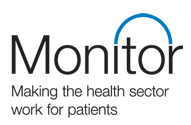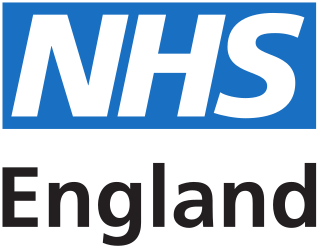Related Research Articles

The Department of Health and Social Care (DHSC) is a ministerial department of the Government of the United Kingdom. It is responsible for government policy on health and adult social care matters in England, along with a few elements of the same matters which are not otherwise devolved to the Scottish Government, Welsh Government or Northern Ireland Executive. It oversees the English National Health Service (NHS). The department is led by the Secretary of State for Health and Social Care with three ministers of state and three parliamentary under-secretaries of state.

The National Institute for Health and Care Excellence (NICE) is an executive non-departmental public body, in England, of the Department of Health and Social Care, that publishes guidelines in four areas:
An NHS foundation trust is a semi-autonomous organisational unit within the National Health Service in England. They have a degree of independence from the Department of Health and Social Care. As of March 2019 there were 151 foundation trusts.
Strategic health authorities (SHA) were part of the structure of the National Health Service in England between 2002 and 2013. Each SHA was responsible for managing performance, enacting directives and implementing health policy as required by the Department of Health at a regional level. Initially 28 in number, they were reduced to 10 in 2006. Along with primary care trusts, they were replaced by clinical commissioning groups and Public Health England in 2013 under the Health and Social Care Act 2012.

Monitor was an executive non-departmental public body of the Department of Health, responsible between 2004 and 2016 for ensuring healthcare provision in NHS England was financially effective. It was the sector regulator for health services in England. Its chief executive was Ian Dalton and it was chaired by Dido Harding. Monitor was merged with the NHS Trust Development Authority to form NHS Improvement on 1 April 2016.

Primary care trusts (PCTs) were part of the National Health Service in England from 2001 to 2013. PCTs were largely administrative bodies, responsible for commissioning primary, community and secondary health services from providers. Until 31 May 2011, they also provided community health services directly. Collectively PCTs were responsible for spending around 80 per cent of the total NHS budget. Primary care trusts were abolished on 31 March 2013 as part of the Health and Social Care Act 2012, with their work taken over by clinical commissioning groups.

NHS Scotland, sometimes styled NHSScotland, is the publicly–funded healthcare system in Scotland and one of the four systems that make up the National Health Service in the United Kingdom. It operates 14 territorial NHS boards across Scotland, supported by seven special non-geographic health boards, and Public Health Scotland.
Basildon and Thurrock University Hospitals NHS Foundation Trust provided healthcare for people in south west Essex, in the East of England. There were two hospitals in the trust, a specialist cardiothoracic centre and one clinical centre: Basildon University Hospital, Orsett Hospital, The Essex Cardiothoracic Centre and Billericay St. Andrew's Centre. It became a Foundation Trust in 2004.

Emergency medical services in the United Kingdom provide emergency care to people with acute illness or injury and are predominantly provided free at the point of use by the four National Health Services (NHS) of England, Scotland, Wales, and Northern Ireland. Emergency care including ambulance and emergency department treatment is only free to UK residents and a charge may be made to those not entitled to free NHS care.

Healthcare in the United Kingdom is a devolved matter, with England, Northern Ireland, Scotland and Wales each having their own systems of publicly funded healthcare, funded by and accountable to separate governments and parliaments, together with smaller private sector and voluntary provision. As a result of each country having different policies and priorities, a variety of differences have developed between these systems since devolution.

The National Health Service (NHS) is the publicly funded healthcare system in England, and one of the four National Health Service systems in the United Kingdom. It is the second largest single-payer healthcare system in the world after the Brazilian Sistema Único de Saúde. Primarily funded by the government from general taxation, and overseen by the Department of Health and Social Care, the NHS provides healthcare to all legal English residents and residents from other regions of the UK, with most services free at the point of use for most people. The NHS also conducts research through the National Institute for Health and Care Research (NIHR).
Healthcare in England is mainly provided by the National Health Service (NHS), a public body that provides healthcare to all permanent residents in England, that is free at the point of use. The body is one of four forming the UK National Health Service, as health is a devolved matter; there are differences with the provisions for healthcare elsewhere in the United Kingdom, and in England it is overseen by NHS England. Though the public system dominates healthcare provision in England, private health care and a wide variety of alternative and complementary treatments are available for those willing and able to pay.

The Health and Social Care Act 2012 is an act of the Parliament of the United Kingdom. It provided for the most extensive reorganisation of the structure of the National Health Service in England to date. It removed responsibility for the health of citizens from the Secretary of State for Health, which the post had carried since the inception of the NHS in 1948. It abolished primary care trusts (PCTs) and strategic health authorities (SHAs) and transferred between £60 billion and £80 billion of "commissioning", or healthcare funds, from the abolished PCTs to several hundred clinical commissioning groups, partly run by the general practitioners (GPs) in England. A new executive agency of the Department of Health, Public Health England, was established under the act on 1 April 2013.
Health Education England (HEE) is an executive non-departmental public body of the Department of Health and Social Care. Its function is to provide national leadership and coordination for the education and training within the health and public health workforce within England. It has been operational since June 2012.

NHS England, formerly the NHS Commissioning Board, is an executive non-departmental public body of the Department of Health and Social Care. It oversees the budget, planning, delivery and day-to-day operation of the commissioning side of the National Health Service in England as set out in the Health and Social Care Act 2012. It directly commissions NHS general practitioners, dentists, optometrists and some specialist services. The Secretary of State publishes annually a document known as the NHS mandate which specifies the objectives which the Board should seek to achieve. National Health Service Regulations are published each year to give legal force to the mandate.
Healthwatch England is a committee of the Care Quality Commission established under the Health and Social Care Act 2012, which took effect in April 2013. Its role is to gather and champion the views of users of health and social care services, in order to identify improvements and influence providers' plans. The Healthwatch network is made of up of local Healthwatch groups in each of England's local authority areas, and Healthwatch England, the national body.
Professor Sir Norman Stanley Williams is a British surgeon and former President of the Royal College of Surgeons of England (2011–14).
Exercise Cygnus was a three-day simulation exercise carried out by the UK Government in October 2016 to estimate the impact of a hypothetical H2N2 influenza pandemic on the United Kingdom. It aimed to identify strengths and weaknesses within the United Kingdom health system and emergency response chain by putting it under significant strain, providing insight on the country's resilience and any future ameliorations required. It was conducted by Public Health England representing the Department of Health and Social Care, as part of a project led by the "Emergency Preparedness, Resilience and Response Partnership Group". Twelve government departments across Scotland, Wales and Northern Ireland, as well as local resilience forums (LRFs) participated. More than 950 workers from those organisations, prisons and local or central government were involved during the three-day simulation, and their ability to cope under situations of high medical stress was tested.

The Health and Care Act 2022 is an act of the Parliament of the United Kingdom, which was created to dismantle many of the structures established by the Health and Social Care Act 2012. Many of the proposals were drafted under the leadership of Simon Stevens and are intended to reinforce the ambitions of the NHS Long Term Plan.
References
- ↑ "Independent Reconfiguration Panel" . Retrieved 8 May 2011.
- ↑ "NHS Organisations Involved". Archived from the original on 28 March 2012. Retrieved 8 May 2011.
- ↑ "Independent Reconfiguration Panel will not be abolished by new legislation". Health Service Journal. 17 June 2021. Retrieved 28 July 2021.